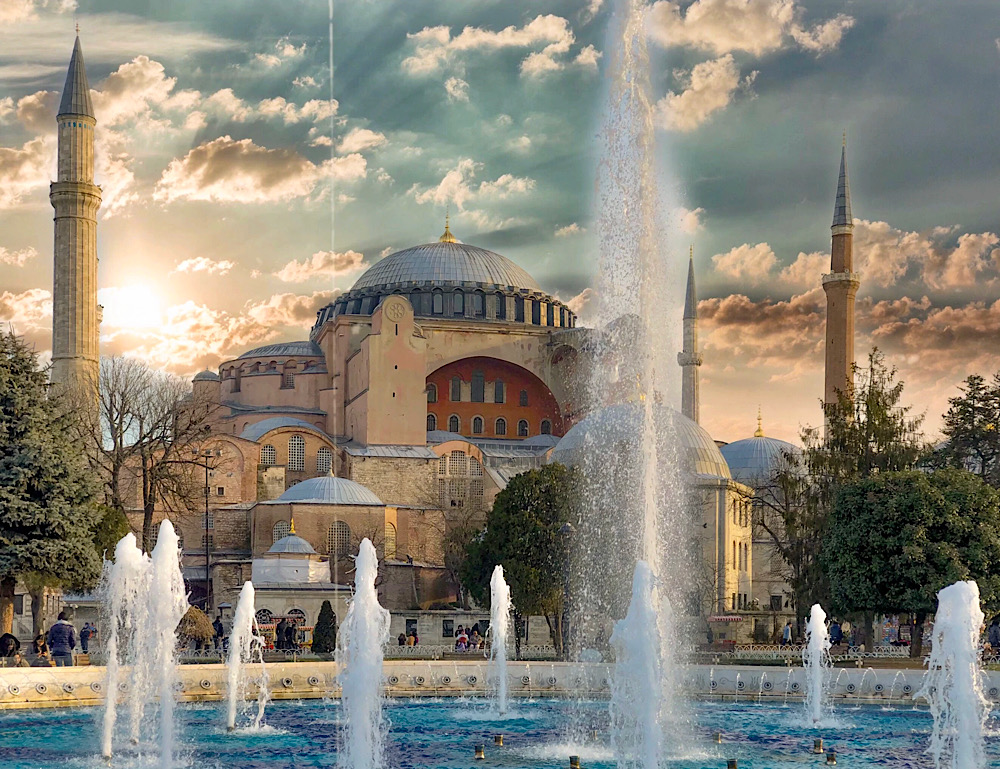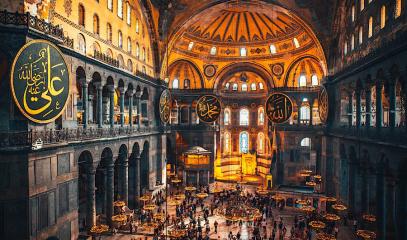Istanbul, work begins on the Hagia Sophia. Controversy over closure rumours
Extraordinary repair and maintenance work needed. Undefined timeframes, some experts even speak of 50 years for completion. The closure hypothesis a 'political issue'. The denial by the Minister of Tourism that it will be regularly opened as a mosque (and open to tourists).
Istanbul (AsiaNews) - The Turkish government has started extraordinary - and long-term - repair and maintenance work on the former Hagia Sophia basilica in Istanbul, which a few years ago was converted into a mosque at the behest of President Recep Tayyip Erdogan.
The decision was based on the discovery, by a group of scientists, of "significant damage" both inside and outside the Byzantine-era monument; at the moment the exact severity of the problem is not known, but some experts are already talking about a "long" term project that could take up to 50 years to be completed.
Statements that have raised concern and "suspicions" in some Turkish circles, according to which there is a question of political expediency behind the decision, so that Hagia Sophia remains closed for some time and is not used as a mosque.
Observers recall that in the same period of the conversion of the current Blue Mosque, another Christian building, the Chora (Kariye) monastery also underwent the same treatment with the transformation into a Muslim place of worship. However, there were no Islamic celebrations, prayers or rites inside because it was "suddenly" closed for restoration work.
Turkish Tourism Minister Mehmet Nuri Ersoy intervened on the controversy, assuring that Hagia Sophia will remain open and will also function as a mosque during the renovation works.
Various studies are currently underway to evaluate the best intervention, in particular in an anti-seismic perspective to avoid the possibility of a collapse in the prospect - not too remote - of a strong earthquake in the Istanbul area. Added to this are also maintenance works on the domes due to rainwater leaks and infiltrations.
Guides and archaeologists explain that during the restoration work the prayer area and the visiting areas will necessarily have to be limited, which means that for some time it will be necessary to seal the gates and deny access to visitors and faithful.
Turkish media have highlighted several times that the conversion of Hagia Sophia into a mosque and free access to the site have put a strain on this cultural heritage monument, and many reports have already been published about the damage caused by visitors to the walls and gates.
In May last year the first injuries to the structure were recorded, confirming the fears of the antiquities experts who were alarmed and UNESCO had threatened to remove the ancient Christian basilica from the world heritage sites.
Because, as then happened, under the control of the Turkish government it would have lost its universal character and risked being damaged, compromising its historical, cultural and symbolic value as an element of unity for all Turkish citizens. The damage concerned the imperial oak doors, from which the vandals apparently tore off some pieces.
A few weeks earlier, after almost a century, the first Islamic prayers for the period of Ramadan, the sacred month of Muslim fasting and prayer, were celebrated, led by the powerful Ali Erbas, head of the Diyanet (the Presidency of Religious Affairs, which governs the Sunni Muslims ).
The conversion into mosques of the ancient Christian basilicas - then museums at the beginning of the 20th century under Ataturk - of Hagia Sophia and Chora was part of the nationalist and Islamic policy implemented by President Erdogan to hide the economic crisis and maintain power.
Following the decree that sanctioned its transformation, the Muslim authorities covered with a white curtain the images of Jesus, frescoes and icons that testify to the Christian roots of the thousand-year-old structure dedicated to the wisdom of God and dating back to the sixth century.
The transformation of the two buildings - UNESCO world heritage sites - took place in 2020 in the first phase of the pandemic, within a political-religious controversy that crossed national borders.
Confirming the struggle around the site and the ongoing "cancellation" policy, the Turkish newspaper Hürriyet reports that restoration work began on September 9th.
However, while describing all the projects and the different work plans, including a virtual reconstruction of the structure, we always talk about a mosque (and a former museum), but there is no mention of its origins as a Christian basilica and its Orthodox roots and Byzantine.
24/07/2020 17:03








.png)










